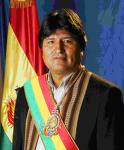BOGOTÁ, Colombia -- President Evo Morales wants to "refound Bolivia." His Ecuadorian counterpart Rafael Correa wants to "correct the barbarities committed by the party-ocracy." Their chosen method -- like Venezuela's Hugo Chávez before them -- is a new constitution. Ecuador will elect a Constituent Assembly on Sept. 30; Bolivia's version has been deliberating since June 2006. Meanwhile, Chávez himself is trying to reform the 1999 constitution that he promulgated, including provisions for a new six-hour week and a much-publicized change in the country's time zone. The moves are far from unprecedented. For Latin American constitutions, life has often been nasty, brutish and short. Since 1811, Venezuela has had 25 constitutions -- more than its initial model, the U.S. Constitution, has had amendments. This is not just radical leftism, but instead draws on a continent-wide tradition. During the 1930s and 1940s, and again in the late 1980s and the 1990s, the constitutions of most Latin American countries were rewritten or substantially altered. This might suggest that it is easy and desirable. By comparison with the United States, perhaps. In absolute terms, almost certainly not.
Latin American Leaders Need Less Constitutional Reform, More Action

